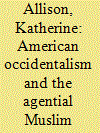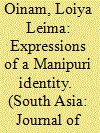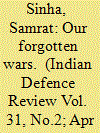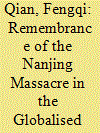| Srl | Item |
| 1 |
ID:
120478


|
|
|
|
|
| Publication |
2013.
|
| Summary/Abstract |
Through the War on Terror the United States developed a seemingly enlightened understanding of Muslim women. In contrast to Orientalised representations of Muslim women's passivity and victimisation within brutal Islamic cultures these emerging representations posit Muslim women in terms of their modernity and liberation. The emergence of this new Muslim woman illuminates an attempt to secure an Occidental self through the negotiation of conflicting impulses towards Islam. Islam is recognised as the repository from which the US enemy other emerges yet the WoT also reflects a particular desire for a cosmopolitan inclusivity. The presence of the Muslim woman acts to assuage these tensions. Her oppression confirms the barbarity of the enemy yet the combination of her intrinsic agency and religiosity posits her as an acceptable Islamic other whose presence confirms the pluralistic tolerance of the US and the universal validity of its project.
|
|
|
|
|
|
|
|
|
|
|
|
|
|
|
|
| 2 |
ID:
145465


|
|
|
|
|
| Summary/Abstract |
Although contemporary Manipuri poetry is preoccupied with violence and the politics that has plagued the state, a return to modernist poetry, prominent in the 1970s, reconfigures the discourse surrounding identity formation in Manipur. The essay focuses on the modernist poet Thangjam Ibopishak to study the change in the constitution of identity in a pervasive military culture. It argues that Ibopishak's poetry is an important intervention in our understanding of societies characterised by processes of militarisation, and the victimised subjectivities that emerge from that milieu. His poetry, marked by irony and satire, invents a new poetic idiom to address issues such as military excess, victimhood, censorship and the poet's own position as subject.
|
|
|
|
|
|
|
|
|
|
|
|
|
|
|
|
| 3 |
ID:
146602


|
|
|
|
|
| Contents |
The humanitarian emergency which occurred in the aftermath of the 2012 violence between
Bodos and Bengali muslims (in which more than 1000 people were killed) was a crisis of immense magnitude and stretched the existing reponse mechanisms. According to the data provided by the Assam State Disaster Management Authority (ASDMA), the peak of the crisis witnessed 485,921 persons displaced (in September 2012) with 246,582 persons residing in formal relief camps. The duration of the emergency can be gauged by the fact that as of January 31, 2013, there were still 38,959 persons still residing in formal camps. These camps were ethnically segregated with Bodos and muslims residing separately.
|
|
|
|
|
|
|
|
|
|
|
|
|
|
|
|
| 4 |
ID:
165267


|
|
|
|
|
| Summary/Abstract |
Victimisation is a pivotal theme in China’s new remembering of its War of Resistance against Japanese Aggression. While much of the world is talking about the rise of China, why are the Chinese still looking back to the nation’s sufferings in the past? This article investigates the development and dissemination of China’s collective memory of wartime victimisation, through a case study of the Nanjing Massacre Memorial. The article examines the ‘presentist’ use of the collective memory of victimisation in China’s era of opening up. It argues that the collective memory of victimisation is an emotional memory, evoked by new nationalism thinking, and is therefore a contextual dimension of China’s self-presentation today. The development as well as the dissemination of this memory parallels the path of China’s rise to become a world power. The Nanjing Massacre Memorial showcases the way in which the collective memory of victimisation is shaped and disseminated under the Communist Party to promote China’s national aspirations and legitimise China’s claims in the contemporary world.
|
|
|
|
|
|
|
|
|
|
|
|
|
|
|
|